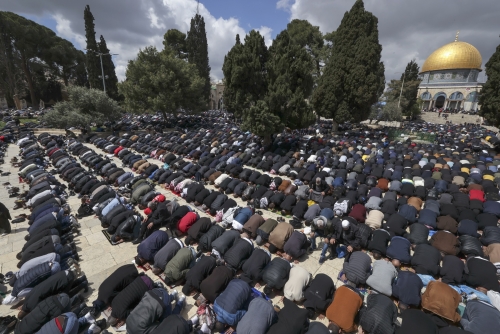Huge crowds in Jerusalem for second Friday of Ramadan
AFP | Jerusalem
The Daily Tribune – www.newsofbahrain.com
Thousands of worshippers packed Jerusalem’s Al-Aqsa mosque compound on the second Friday of Ramadan, for peaceful prayers. The Jordanian body which administers the mosque compound in Israeli-annexed east Jerusalem said that 250,000 people prayed at Islam’s third holiest site, built on what Jews call the Temple Mount, Judaism’s holiest site.
Israeli police, who guard the entrances to the compound, said more than 100,000 worshippers attended -- “almost twice as many as on the second Friday of the month of Ramadan last year” -- and that some 2,000 officers were deployed in the city.
In past years, the Old City was the setting for violence during Ramadan, but no major incidents were reported on Friday. The Israeli-Palestinian conflict had seen an upsurge of violence since the beginning of the year, raising fears of a flare-up during Ramadan.
But the past 10 days since the start of the holy fasting month have seen a relative lull in violence. Israel has been allowing Palestinians from the occupied West Bank to enter Jerusalem for Ramadan prayers, with COGAT, the Israeli defence ministry body responsible for civil affairs in the Palestinian territories, saying over 70,000 people crossed on Friday.
Posting images on Twitter of worshippers crowded at Israeli checkpoints en route to Jerusalem, Palestinian civil affairs minister Hussein al-Sheikh blasted the “strict and humiliating measures”. The Israeli army meanwhile announced the crossings from Gaza and the West Bank would be closed from Wednesday evening to Saturday night due to the Jewish festival of Passover.
Palestinians from the West Bank will be able to cross on Friday for Ramadan prayers. The crossings will be closed again on April 11 and 12, the end of Passover, the army said, adding that exceptions may be allowed on humanitarian or medical grounds.
Related Posts

